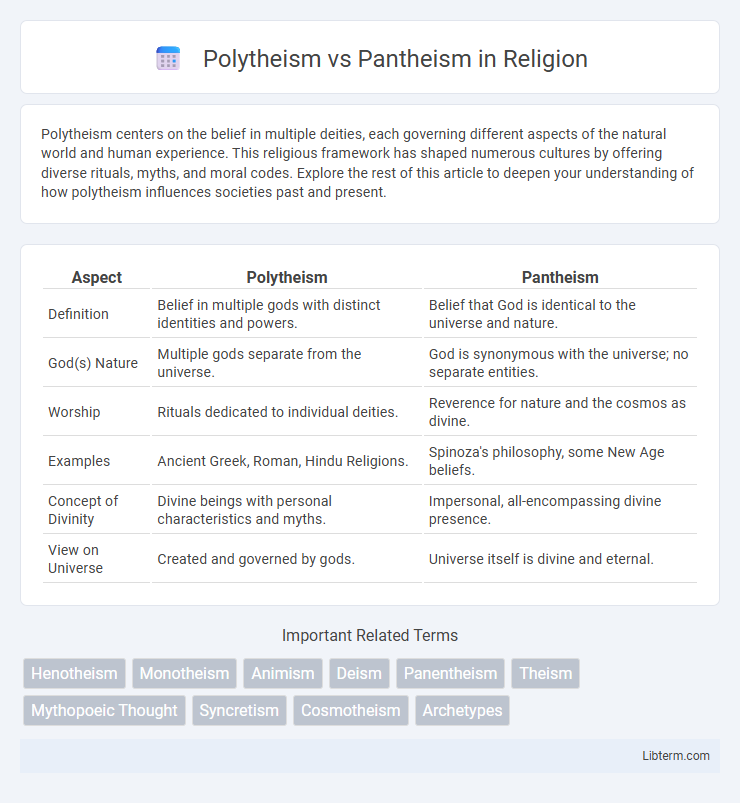Polytheism centers on the belief in multiple deities, each governing different aspects of the natural world and human experience. This religious framework has shaped numerous cultures by offering diverse rituals, myths, and moral codes. Explore the rest of this article to deepen your understanding of how polytheism influences societies past and present.
Table of Comparison
| Aspect | Polytheism | Pantheism |
|---|---|---|
| Definition | Belief in multiple gods with distinct identities and powers. | Belief that God is identical to the universe and nature. |
| God(s) Nature | Multiple gods separate from the universe. | God is synonymous with the universe; no separate entities. |
| Worship | Rituals dedicated to individual deities. | Reverence for nature and the cosmos as divine. |
| Examples | Ancient Greek, Roman, Hindu Religions. | Spinoza's philosophy, some New Age beliefs. |
| Concept of Divinity | Divine beings with personal characteristics and myths. | Impersonal, all-encompassing divine presence. |
| View on Universe | Created and governed by gods. | Universe itself is divine and eternal. |
Understanding Polytheism: Definition and Origins
Polytheism, defined as the belief in multiple gods, originated in ancient civilizations such as Mesopotamia, Egypt, and Greece, where deities represented natural forces and social concepts. This religious framework features gods with distinct personalities and domains, influencing culture, rituals, and mythology. Understanding polytheism involves recognizing its role in explaining the natural world and human experience through a diverse pantheon of divine beings.
Exploring Pantheism: Meaning and Historical Roots
Pantheism is a belief system that identifies God with the universe, asserting that everything collectively forms a divine unity, contrasting with polytheism's worship of multiple distinct gods. It has historical roots in ancient philosophies such as Stoicism and Hinduism, where the divine is seen as immanent and intrinsic to all existence. This worldview influences modern ecological and spiritual movements by emphasizing the sacredness of nature and the interconnectedness of all life.
Key Differences Between Polytheism and Pantheism
Polytheism involves the belief in multiple distinct gods with individual identities and roles, while pantheism equates God with the universe itself, viewing divinity as all-encompassing and immanent. In polytheistic traditions, deities often personify natural forces or concepts, worshipped separately, whereas pantheism emphasizes the unity and interconnectedness of all existence as a single divine reality. The theological scope of polytheism is pluralistic and hierarchical, contrasting with pantheism's holistic and monistic perspective on divinity.
Gods and Divinity in Polytheism
Polytheism features multiple gods, each with distinct personalities, powers, and domains, embodying various aspects of life and nature, such as Zeus as the god of the sky and Athena as the goddess of wisdom. These deities are often anthropomorphic and interact directly with humans, engaging in mythological stories that explain natural phenomena and cultural practices. Polytheistic divinity is characterized by a hierarchical pantheon, ritual worship, and festivals dedicated to specific gods, distinguishing it from the unified divinity concept in pantheism.
The Divine Universe in Pantheism
Pantheism identifies the divine with the universe itself, asserting that everything that exists is a manifestation of an all-encompassing, immanent divinity. Unlike polytheism, which believes in multiple distinct gods with separate identities and realms, pantheism emphasizes the unity and interconnectedness of all cosmic elements as parts of one sacred totality. This view fosters an ecological and spiritual reverence for nature, recognizing the cosmos as a living, divine entity rather than a collection of individual deities.
Worldview and Spiritual Practice Comparison
Polytheism embraces a worldview centered on multiple distinct deities, each governing specific aspects of nature or human experience, with spiritual practices involving rituals, prayers, and offerings directed to individual gods or goddesses. Pantheism presents a worldview equating divinity with the universe itself, promoting a spiritual practice that emphasizes unity with nature and the cosmos, often through meditation, contemplation, and reverence for the interconnectedness of all existence. While polytheism cultivates a diverse and personalized worship system, pantheism fosters a holistic sense of sacredness permeating all matter and energy.
Polytheism in Ancient and Modern Cultures
Polytheism, characterized by the belief in multiple gods with distinct identities and roles, has been a foundational aspect of ancient civilizations such as Mesopotamia, Ancient Egypt, Greece, and Rome, influencing religion, culture, and societal structures. In modern contexts, polytheism persists in various traditions like Hinduism, Shinto, and neo-pagan movements, where diverse deities continue to embody natural forces and human experiences. This enduring presence highlights the adaptability of polytheistic systems in addressing spiritual and existential questions across different historical periods.
Pantheism in Philosophy and Science
Pantheism, rooted in both philosophy and science, posits that the universe and God are identical, emphasizing an immanent divinity present in all matter and energy. Philosophers like Spinoza conceptualized God as the single substance forming the cosmos, aligning this belief with natural laws and the interconnectedness of existence. Modern scientific perspectives, especially in cosmology and quantum physics, increasingly reflect pantheistic themes by highlighting the unity and interdependence of all cosmic phenomena.
Ethical Implications of Polytheist and Pantheist Beliefs
Polytheism, which worships multiple distinct deities often with specialized roles, fosters ethical systems based on diverse divine laws and virtues tied to each god, encouraging a pluralistic moral framework. Pantheism, identifying the divine with the universe itself, promotes an ethical perspective centered on unity, environmental stewardship, and interconnectedness of all life. Both belief systems influence ethical decision-making differently: polytheism emphasizes respect for varied moral codes derived from deities, while pantheism advocates for holistic ethics grounded in universal oneness.
Contemporary Relevance: Polytheism vs Pantheism
Polytheism, characterized by belief in multiple distinct deities, often reflects diverse cultural traditions and rituals that remain vital in contemporary indigenous and neo-pagan communities worldwide. Pantheism, which equates God with the universe itself, resonates strongly with modern ecological and spiritual movements emphasizing interconnectedness and environmental stewardship. The contemporary relevance of these belief systems lies in their contribution to pluralistic religious landscapes, offering alternative frameworks for understanding divinity and humanity's relationship with nature.
Polytheism Infographic

 libterm.com
libterm.com